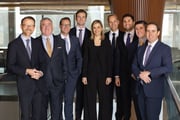
Office address: 50 Hudson Yards New York, NY 10001
Website: www.blackrock.com
Year established: 1988
Company type: investment company
Employees: 19,800+
Expertise: asset management, risk management, ETFs (iShares), fixed income, alternative investments, wealth management, retirement solutions, private equity, infrastructure, real estate, sustainable investing, financial technology
Parent company: N/A
Key people: Larry Fink (CEO), Rob Kapito (president), Joud Abdel Majeid (global head), Stephen Cohen (CPO), Ed Fishwick (CRO), Rob Goldstein (COO), Martin Small (CFO), Chris Meade (CLO)
Financing status: N/A
BlackRock is a global investment company from New York, offering asset management, advisory, and risk management services. The firm manages $11.5 trillion in assets as of October 2024 and operates in over 38 countries. With over 19,800 employees, the company serves clients in more than 100 countries, helping them achieve long-term financial well-being through innovative financial solutions.
BlackRock was founded in 1988 by Laurence Fink and seven partners, driven by a desire to manage assets with a focus on risk management and client interests. The company quickly grew, and in 1999, it launched Aladdin, its proprietary technology that transformed the risk management industry. During the 2008 financial crisis, the company was tapped by the Federal Reserve to assess Bear Stearns' assets, playing a crucial advisory role.
In 2009, it acquired Barclays Global Investors, becoming the world's largest asset manager and integrating both active and index strategies. In 2017, the company deepened its focus on investment stewardship, emphasizing the long-term value of purpose in profitability. By 2024, it partnered with Vestmark to boost model portfolios, further expanding its offerings for registered investment advisors.
BlackRock offers a wide range of investment products and services designed to meet the diverse needs of its clients. Below are the some of their key offerings:
BlackRock’s global team provides insights on markets, economies, and long-term strategies, helping clients navigate the complexities of investing. Whether it is a professional or a new investor, their services aim to support financial success while also empowering employees and giving back to communities.
BlackRock’s culture is built on a commitment to its clients, employees, and core principles. The company focuses on employee growth, offering benefits that support physical, emotional, and financial well-being. The firm provides various resources and benefits to keep employees engaged and balanced, some of which include:
The firm’s commitment to diversity, equity, and inclusion (DEI) is central to its success, fostering an environment where employees feel a sense of belonging. The company’s global platform thrives by incorporating diverse perspectives to deliver the best outcomes for clients. By embracing unique skills and experiences, they empower employees to collaborate effectively and contribute to a shared mission:
The company’s social impact focuses on making financial prosperity accessible to more people and communities. The BlackRock Foundation supports low- to moderate-income households by helping them save, invest, and build wealth. Initiatives include:
BlackRock’s approach to corporate sustainability focuses on long-term value for shareholders, employees, communities, and clients. The company is committed to transparency, providing stakeholders with meaningful sustainability-related information.
Laurence Fink is company’s chairman, CEO, and founder, also serving on the boards of NYU and the World Economic Forum. Before founding BlackRock in 1988, he was a managing director at The First Boston Corporation. Fink earned a BA in political science and an MBA in real estate from UCLA.
The company’s key leadership team includes notable figures who lead the firm’s operations across global markets:
To prepare for potential market volatility, BlackRock advises financial professionals to reduce risk and shift toward safer investment options. With uncertainty ahead, particularly due to macroeconomic concerns and the upcoming elections, the firm highlights the importance of defensive strategies like the BlackRock Flexible Income ETF (BINC). This strategic adjustment also reflects their broader move toward active management, signaling its belief in a more hands-on approach during turbulent times.
The company recently reached an $11.5 trillion milestone in assets under management by the third quarter of 2024. This growth was driven by strong client inflows, notably into ETFs, fixed income, and private assets. BlackRock is accelerating its push into private assets, following acquisitions like Global Infrastructure Partners, and continues to lead in both public and private markets.

Money markets, bonds, real estate, and the heating industry among new funds.

The Pennsylvania-based fund giant stands to gain ground against rivals such as BlackRock while earning more goodwill from retail investors.

Morningstar research reveals what's holding some advisors back, and which providers are leading the way in responding.

Big fund companies have backed off of ESG, and US funds have closed amid political pressure and as investors have pulled money from them. The funds that remain reveal which managers are committed.

The Jack Bogle-founded firm expects its decision to slash costs for dozens of mutual funds and ETFs will save investors $350 million this year alone.

The New York-based firm's new unit will be headed by a seasoned Blackstone veteran, with a team of alums from Carlyle, Nuveen, BlackRock and CAIS.

The state's attorney general warned Goldman, JPMorgan, BlackRock, and other heavyweights of possible legal consequences to their diversity policies.

With sticky investors and strong initial inflows for 2025, the S&P 500 tracking ETF is threatening the decades-long reign of State Street's SPY.

With 565 launches and $312 billion in inflows last year, active ETF strategies are set to continue taking dollars from mutual funds, says report.

Plaintiffs successfully sued American Airlines over an asset manager's ESG considerations in the proxy-voting process, and that could get the plaintiffs' bar quite interested in filing similar claims against 401(k) sponsors.

The presiding judge found the airline breached its fiduciary duty under federal law by prioritizing non-financial considerations in its employee retirement plan.

The asset management giant took third place for overall flows last year as it tapped into a divisive debate on how to play US stocks.

The world's largest asset manager claims leadership as the first investor to buy a piece of the first-of-its-kind municipal bond issuance.

Fewer are calling their strategies "ESG," but fund companies and institutional investors told US SIF they see the category growing over the next couple years.

But even after an epic year with more ETF conversions expected, one expert argues mutual funds will always have a place.
